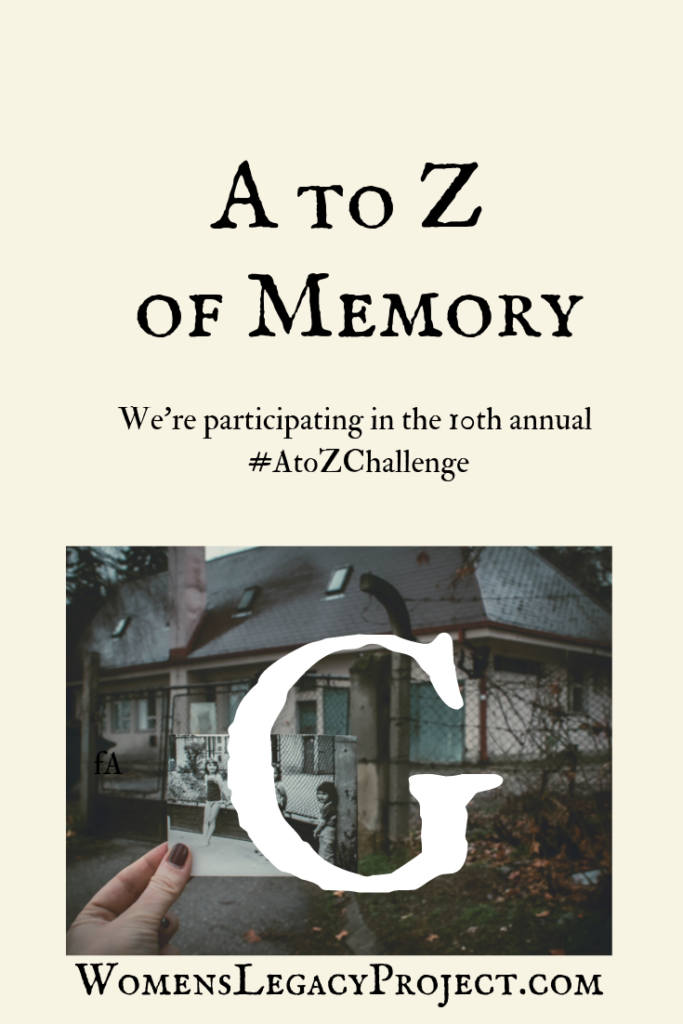Memory changes its character once death claims a person or people with whom a memory was shared. Grieving individuals or families tell stories about the deceased to solidify and reinforce a narrative of the dying or dead person. As someone is dying, or after someone in the family dies, a consensually created memory emerges. Sometimes individuals or families keep a silence about aspects of a person’s life when they are grieving which can also create a consensual memory.

Grieving involves a conceptual change in perception; a person is shifted from an active part of the foreground of our lives to a background component, a memory. This transposes figure and ground. We know we can only perceive a thing as a figure or ground at any given moment in time. If we visually conceptualize how memory shifts status from stored information, to an active reconstructed thought, on through consolidation of that memory into a pattern that includes new information, while realizing that each bit of knowledge or memory about that person now has to not only be adjusted as it would be in any recollection but also stored with an entirely new quality that creates a figure/ground context for each bit of memory. The time involved and the complexity of recasting each memory with this new perspective partially explains why inattention, distraction, and confusion are evident in grief, and grief can change our memories of a person, or even our place in life, so profoundly.
When we add in the challenge of dealing with personal memories that may not correspond with everyone else’s memories, some of the reasons for being forgetful, inattentive or lacking in motivation to attend to normal tasks is understandable.

Emotions such as grief and fear involve the the hippocampus and the amygdala within the brain and those same areas are also involved in the process of memory storage as well as being part of what can be thought of as an alert or alarm system. This helps to explain why grief influences memory where fear and anger can both come into play.
Researchers and writers have noted that grief and fear are so very similar.
“No one ever told me that grief felt so like fear. I am not afraid, but the sensation is like being afraid. The same fluttering in the stomach, the same restlessness, the yawning. I keep on swallowing. At other times it feels like being mildly drunk, or concussed. There is a sort of invisible blanket between the world and me. I find it hard to take in what anyone says.”
C. S. Lewis in A Death Remembered
Memory may well involve the whole body and be interlinked with sensorial perception, so grief may well feel like basic emotions such as those involved in fight or flight responses. Activation of sensorial and neural networks is essential in the consolidation and reconstitution of memory.
Grief is a liminal state, a transitional state where status and the way we position ourselves in life is reconfigured. We shift from being one, which we are no longer, to being another, which we are not yet.
Some cultures, through their religious beliefs, see the period soon after death for the deceased individual as a journey through the Bardo. Bardo, as Pema Khandro Rinpoche writes, is a “state in which we have lost our old reality and it is no longer available to us.” This change of state where the deceased confronts demons and undertakes challenges to successfully move on to another life is a change of state mirrors the grieving process of the living.
Memory cannot be separated from knowledge, and we cannot understand what knowledge or memory truly is until we have met and incorporated grief into our lives.
References consulted:
Robert E. Tucker Ph.D. (2001) Figure, ground and presence: A phenomenology of meaning in rhetoric, Quarterly Journal of Speech, 87:4, 396-414, DOI: 10.1080/00335630109384348
Quarterly Journal of Speech Volume 87, 2001 – Issue 4, https://www.tandfonline.com/doi/abs/10.1080/00335630109384348?journalCode=rqjs20
https://barbarafane.com/grief-symptoms-how-grief-affects-the-brain/#.XKratuvYqL8
OMEGA, Vol. 51(1) 1-16, 2005
NARRATIVES AND STORY TELLING IN COPING
WITH GRIEF AND BEREAVEMENT
CECILIA BOSTICCO
TERESA L. THOMPSON, PH.D.
Leave a Reply